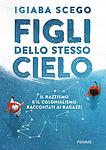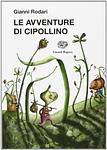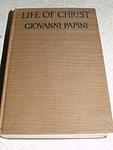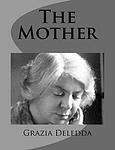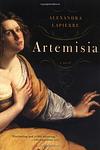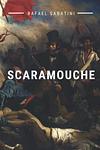The Greatest Italian "Fiction" Books Since 1900
Click to learn how this list is calculated.
This list represents a comprehensive and trusted collection of the greatest books. Developed through a specialized algorithm, it brings together 300 'best of' book lists to form a definitive guide to the world's most acclaimed books. For those interested in how these books are chosen, additional details can be found on the rankings page.
Genres
Countries
Date Range
Reading Statistics
Click the button below to see how many of these books you've read!
Download
If you're interested in downloading this list as a CSV file for use in a spreadsheet application, you can easily do so by clicking the button below. Please note that to ensure a manageable file size and faster download, the CSV will include details for only the first 500 books.
Download-
26. The Ragazzi by Pier Paolo Pasolini
The book is a poignant exploration of post-war Italian youth, delving into the lives of a group of boys from the slums of Rome as they navigate the challenges of poverty, social exclusion, and the struggle to find their identities. Set against the backdrop of a country grappling with the aftermath of fascism and the rise of consumerism, the narrative portrays the harsh realities of street life, where the ragazzi, or boys, engage in petty crime, prostitution, and moments of tenderness, all while dreaming of escape and a better future. The novel is a gritty, raw depiction of the loss of innocence and the corrosive effects of societal neglect on the young generation.
-
27. The Adventures Of Cipollino by Gianni Rodari
"The Adventures of Cipollino" is a delightful children's book filled with whimsical characters and enchanting adventures. Set in a world of fruits and vegetables, the story follows the brave and mischievous Cipollino, a little onion, as he leads a rebellion against the tyrannical Prince Lemon and his oppressive regime. With a blend of humor, fantasy, and social commentary, this captivating tale teaches valuable lessons about justice, friendship, and the power of standing up for what is right.
-
28. The Selected Works of Cesare Pavese by Cesare Pavese
This collection showcases the best works of a renowned Italian author and poet who was deeply influenced by American literature and culture. The book includes his writings that explore themes of loneliness, self-loathing, and existential despair, often set against the backdrop of rural Italy. The author's unique style of storytelling, characterized by his use of simple language and profound introspection, is highlighted in this compilation.
-
29. Gogol's Wife by Tommaso Landolfi
"Gogol's Wife" is a collection of short stories that are known for their unique blend of fantasy, history, and reality. The stories revolve around a variety of themes, from a man's bizarre relationship with his inflatable wife to a writer's struggle with a demanding publisher. The book is characterized by its surrealism, dark humor, and exploration of the human condition, offering readers a glimpse into the strange and often absurd aspects of life.
-
30. The Path to the Nest of Spiders by Italo Calvino
The novel is set in Italy during World War II and follows the journey of a young boy who joins the Italian resistance against the Nazis. The story is a coming-of-age tale that explores the boy's struggle to find his identity amidst the chaos of war. Along the way, he encounters various characters, each with their own stories and perspectives on the war, which further shape his understanding of the world. The title refers to a hidden nest of spiders the protagonist discovers, symbolizing the hidden complexities of life and war.
-
31. Disobedience by Alberto Moravia
"Disobedience" is a novel about a young man, Luca, who refuses to serve in the Italian army during World War II. The narrative explores his experiences as he hides from the authorities, the moral dilemmas he faces, his sexual awakening, and his relationship with his mother. His refusal to obey the military draft serves as a symbol of his rebellion against societal norms and expectations, as well as his search for personal identity and freedom.
-
32. Bébo's Girl by Carlo Cassola
"Bébo's Girl" is a poignant tale set in the backdrop of World War II, focusing on the relationship between a young partisan, Bebo, and Mara, a simple and innocent country girl. Their love story unfolds amidst the grim realities of war, where Bebo's commitment to his cause often conflicts with the peaceful life he desires with Mara. The narrative explores themes of love, sacrifice, and the devastating impact of war on personal lives, ultimately leading to a tragic end.
-
33. Conversations in Sicily by Elio Vittorini
"Conversations in Sicily" is a semi-autobiographical novel that explores the journey of a man returning to his native Sicily after many years away. The protagonist's journey is both physical and emotional as he reconnects with his past, his culture, and his mother, while also confronting his disillusionment with the political and social realities of the time. The narrative is filled with poetic and philosophical dialogues, providing a deep exploration of Sicilian life, identity, and the human condition.
-
34. The Castle of Crossed Destinies by Italo Calvino
"The Castle of Crossed Destinies" is a unique narrative where the characters, unable to speak, tell their stories through the use of tarot cards. The book is divided into two parts, each set in a different castle, and features a variety of characters, including knights, kings, and queens, who each use the cards to weave their own tales. The stories are interconnected, creating a complex web of tales that explore themes of fate, destiny, and the interconnectedness of human experiences.
-
35. The Harvesters by Cesare Pavese
"The Harvesters" is an evocative tale set in the rural landscapes of Italy in the early 20th century. The narrative follows a young man who, after a life of hardship and poverty, leaves his village to seek a better life in the city. However, he soon finds himself drawn back to his roots, yearning for the simplicity and authenticity of rural life. The novel explores themes of identity, belonging, and the eternal conflict between progress and tradition, offering a poignant portrayal of the human condition.
-
36. Life of Christ by Giovanni Papini
"Life of Christ" is a comprehensive biography of Jesus Christ, exploring his life, teachings, and impact on humanity. The book delves into the historical, cultural, and spiritual context of his era, providing in-depth analysis of his miracles, parables, and relationships with his disciples and followers. The author also examines the significance of Christ's crucifixion and resurrection, aiming to provide a thorough understanding of his life and mission.
-
37. The Mother by Grazia Deledda
This novel delves into the life of a devout woman torn between her religious convictions and the love for her son, who has strayed from the path she hoped for him. Set in a small village in Sardinia, the narrative explores themes of faith, sin, and redemption, as the mother grapples with her son's affair with a married woman and his detachment from the church. Her internal struggle and the moral dilemmas she faces highlight the complexities of maternal love and the sacrifices it entails. The story is a poignant examination of the conflicts between personal desires, societal expectations, and spiritual beliefs in early 20th-century Italy.
-
38. The Patriot by Antonio Fogazzaro
This novel, set in Italy during the latter half of the 19th century, weaves a compelling narrative around the life of its protagonist, a nobleman deeply involved in the Italian unification process. The story delves into his internal conflicts and moral dilemmas as he navigates the turbulent political landscape of the time, striving to reconcile his patriotic fervor with his personal beliefs and relationships. The book explores themes of love, faith, and the struggle for political change, offering a nuanced portrayal of the complexities faced by individuals caught in the throes of national upheaval. Through its rich character development and evocative depiction of historical events, the novel provides a poignant exploration of the human condition amidst the backdrop of significant societal transformation.
-
39. The Little World Of Don Camillo by Giovanni Guareschi
This book is a charming collection of stories set in a small village in post-World War II Italy, where the local priest, Don Camillo, and the communist mayor, Peppone, are constantly at odds. Despite their political and ideological differences, they share a deep, if grudging, respect for each other, often collaborating for the good of their community. The tales are infused with humor, warmth, and a touch of the supernatural, as Don Camillo has conversations with the crucifix in his church, seeking guidance and solace. Through these engaging narratives, the book explores themes of friendship, faith, and the importance of finding common ground amidst conflict.
-
40. The Neapolitan Novels by Elena Ferrante
"The Neapolitan Novels" is a four-part series that explores the intricate and lifelong friendship between two women from Naples, Italy. The series spans several decades, beginning in the 1950s, and provides a detailed examination of the women's lives, struggles, and the societal pressures they face. The narrative delves into themes of identity, friendship, love, violence, and socio-political changes in post-war Italy. The series is known for its rich character development and vivid portrayal of female friendship.
-
41. That Awful Mess On Via Merulana by Carlo Emilio Gadda
This novel is a complex and richly detailed exploration of a crime in 1920s Rome, where an investigation into a theft and a brutal murder in an apartment building on Via Merulana becomes a sprawling narrative that delves into the social, political, and cultural fabric of Italy. The detective in charge of the case navigates through a maze of clues, red herrings, and eccentric characters, revealing not just the underbelly of Roman society but also the inherent chaos and absurdity of life. The narrative is characterized by its linguistic inventiveness, with a mix of literary Italian, Roman dialect, and technical jargon, making it a challenging yet rewarding read that transcends the boundaries of the detective genre to offer a profound commentary on the human condition.
-
42. Fontamara by Ignazio Silone
This novel is set in a small, impoverished village in Italy during the Fascist regime. It tells the story of the villagers, known as "Fontamaresi," who are struggling to survive under the oppressive government policies and the exploitation by the local elite. The narrative focuses on their attempts to resist and fight back against the injustices they face, despite the overwhelming odds. Through the eyes of its characters, the book explores themes of poverty, oppression, resistance, and the human spirit's resilience. It is a poignant critique of Fascism and a testament to the strength of community and solidarity in the face of tyranny.
-
43. Artemisia by Anna Banti
"Artemisia" is a historical novel that delves into the life of Artemisia Gentileschi, a pioneering female painter of the Baroque era, who overcame the constraints of her time to achieve artistic greatness. The narrative intertwines the author's own reflections and struggles with the story of Artemisia, creating a rich tapestry that explores themes of feminism, creativity, and resilience. As the protagonist confronts personal tragedy, including a notorious rape trial, and battles societal norms, her journey of self-discovery and determination to succeed as an artist in a male-dominated world is poignantly portrayed, offering a profound meditation on the intersection of history, gender, and art.
-
44. L'iguana by Anna Maria Ortese
The novel revolves around the story of a disillusioned and impoverished nobleman who, during his stay on a desolate Atlantic island, encounters a mysterious iguana-like creature that is actually an enchanted princess. As their friendship develops, the nobleman becomes determined to break the curse that binds her. The narrative, rich in symbolism and allegory, explores themes of isolation, the clash between modernity and tradition, and the nature of humanity's relationship with the otherworldly, all set against the backdrop of a decaying aristocracy and the haunting beauty of the remote island landscape.
-
45. Cosima by Grazia Deledda
The novel unfolds the life of Cosima, a semi-autobiographical character, as she navigates the complexities of her existence in a small Sardinian village. Through her eyes, readers experience the rich tapestry of rural Italian life at the turn of the 20th century, marked by strong family bonds, social expectations, and the struggle for personal independence. As Cosima grows from a curious child into a thoughtful adult, she grapples with her aspirations, the constraints placed upon her by society, and her deep connection to her homeland, all while drawing inspiration from the natural beauty and cultural traditions that surround her. The narrative is a poignant exploration of identity, the pursuit of one's passions against the odds, and the enduring influence of one's roots.
-
46. Troubling Love by Elena Ferrante
This novel follows a woman who returns to Naples after her mother's mysterious death, determined to understand the enigmatic life her mother led. As she delves into her mother's past, she uncovers a web of secrets and discovers more about her own identity in the process. The narrative explores themes of mother-daughter relationships, identity, and the power of the past.
-
47. Pereira Maintains by Antonio Tabucchi
"Pereira Maintains" is a novel set in the backdrop of 1938 Portugal during the fascist dictatorship of Antonio de Oliveira Salazar. The narrative follows Pereira, a widowed, overweight editor of the culture section of a second-rate Lisbon newspaper, who becomes politically awakened after meeting a young anti-fascist. As he grapples with his conscience, he risks everything to help his new friend and his pregnant girlfriend escape to safety. The story is a compelling exploration of the struggle for moral integrity in a climate of political oppression.
-
48. Arturo's Island by Elsa Morante
This novel unfolds on a remote island in the Gulf of Naples, where the young protagonist, Arturo, lives a solitary life steeped in the wild beauty of his surroundings. His existence is dramatically transformed with the arrival of his father's new wife, igniting a complex web of emotions and a tumultuous journey of self-discovery. Through Arturo's eyes, the narrative explores themes of isolation, the search for identity, and the painful awakening to the realities of adulthood, set against the backdrop of a rugged island landscape that mirrors the turbulent inner world of its inhabitants. The story is a poignant exploration of the bonds that tie us to our families and the inevitable loss of innocence, rendered with a lyrical intensity that captures the essence of youth and the stark beauty of the natural world.
-
49. Scaramouche by Rafael Sabatini
This novel is a swashbuckling tale set during the French Revolution, revolving around the life of a young lawyer turned revolutionary, who adopts the guise of Scaramouche, a vagabond performer. After witnessing a grave injustice that affects him personally, the protagonist embarks on a journey of revenge, political activism, and personal transformation. Through his adventures, he becomes a master swordsman and a key figure in the revolutionary movement, all while navigating the complexities of love, friendship, and the quest for justice. The story is a rich tapestry of action, romance, and historical intrigue, exploring themes of identity, revenge, and the quest for equality.
-
50. The Conformist by Alberto Moravia
The novel explores the life and psyche of a government official during the 1930s Fascist Italy, who is driven by a desire to belong and be considered "normal" at any cost. Tormented by his own perceived abnormality and a traumatic past, he becomes obsessed with conforming to the societal norms dictated by the fascist regime. In an attempt to prove his allegiance and suppress his own feelings of inadequacy, he agrees to carry out a political assassination. The narrative delves deep into themes of identity, the nature of conformity, and the moral compromises made by individuals under oppressive political systems.
Reading Statistics
Click the button below to see how many of these books you've read!
Download
If you're interested in downloading this list as a CSV file for use in a spreadsheet application, you can easily do so by clicking the button below. Please note that to ensure a manageable file size and faster download, the CSV will include details for only the first 500 books.
Download